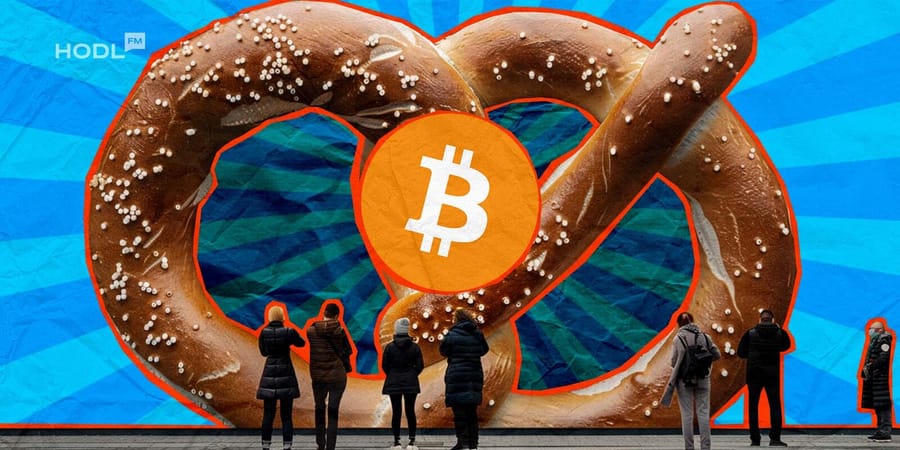When the German government began its initial transfers on June 19, Bitcoin was valued at approximately $65,000. Currently, its price has fallen to $56,586, representing a decline of nearly 13%. Today, we dive into the potential long-term implications of these sell-offs and their impact on overall market confidence.
Related: Bitcoin's Price Turbulence: Market Reactions, Government Moves, and Strategic Investments
Germany’s Bitcoin Yard Sale
The first signs of the ongoing sell-off were reported by Arkham, a blockchain analytics platform, on Monday. Initially, the government sent 2,738.7 BTC ($155.3 million) to "probable exchanges and market makers," including Kraken, Cumberland, an unidentified address, and an address likely associated with an institutional or over-the-counter (OTC) trading service.
Less than two hours later, Arkham reported that Germany sent another 8,100 BTC ($463.2 million) to exchanges like Kraken, Coinbase, and Bitstamp, including $200 million sent to Flow Traders, a proprietary trading firm and market maker.
Immediately following this tweet, the government transferred an additional 5,200 BTC ($297.3 million) to Coinbase, Bitstamp, and an OTC address.
This led to the largest one-day sell-off, with nearly 16,000 BTC transferred in total. Less than half of the initial 50,000 BTC seized from Movie2k, a pirated movie website, remains in Germany. The government's current Bitcoin holdings stand at 23,787.7 BTC, worth $1.35 billion.
The German Government sent another 5200 BTC ($297.3M) to Kraken, Bitstamp, Coinbase and 139Po right after we posted this tweet. That makes this the biggest day for them so far - over 16,000 BTC in total.
— Arkham (@ArkhamIntel) July 8, 2024
They currently hold 23,787.7 BTC ($1.35B). Less than half of the BTC… pic.twitter.com/tO7r0J0w08
Industry Reactions
Just a reminder: over the past weekend, the German government sent 700 BTC worth $40.47 million to the address “139PoP.” The ongoing Bitcoin sell-offs by the German government have undoubtedly shaken the market, reflected in Bitcoin’s price movements since the start of these sales. The German government’s Bitcoin dumping has sparked discussions among industry experts.
Crypto trader Alex Krüger offered an in-depth analysis of the sell-offs. He pointed out that this was the final stage of Germany’s sell-off and that eventually, they would run out of coins. Moreover, he suggested that the market might absorb the remaining coins at once, similar to the Mt. Gox flows.
Daan Crypto echoed these sentiments. He stated that the reduction in the German government's Bitcoin balance is partly responsible for the price drop and the shrinking stack. He believes that the impact should gradually diminish over time.
Ki Young Ju, CEO of CryptoQuant, offered his insights on the situation. He commented that the Bitcoin market is still heavily influenced by "psychological operations."
He wrote on X:
Government BTC sales are negligible compared to the overall liquidity, and most of the Mt. Gox BTC assets have not been transferred to creditors. Crypto Twitter still blames the sell-off for the drop. Smart money replaces dumb money. It's still early.
#Bitcoin market is still heavily influenced by psyops.
— Ki Young Ju (@ki_young_ju) July 8, 2024
Govt BTC selling is negligible compared to overall liquidity, and most Mt. Gox BTC holdings haven't moved to creditors.
CT still blames the drop on govt selling. Smart money is replacing dumb money. We're still early.
Last week, Tron founder and crypto billionaire Justin Sun offered to buy the remaining German Bitcoins to ease the selling pressure on the market.
The government’s approach also faced criticism from German MP Joana Cotar, who recommended that the government hold their coins as part of a diversified treasury instead of selling them all off.
In a July 4 post on X, Joana Cotar expressed her concern about the current government strategy, stating: "Instead of holding Bitcoin as a strategic reserve currency, as is already being discussed in the US, our government is selling it off in large quantities."
Statt #Bitcoin als strategische Reservewährung zu halten, wie es in den USA bereits debattiert wird, verkauft unsere Regierung im großen Stil. Ich habe @MPKretschmer, @c_lindner & @Bundeskanzler @OlafScholz darüber informiert, warum dies nicht nur nicht sinnvoll, sondern… pic.twitter.com/v9FpzmfLbp
— Joana Cotar (@JoanaCotar) July 4, 2024
Unlike their US counterparts, who have seized even larger amounts of Bitcoin, Germany is selling off its coins for fiat currency much faster, much to the disappointment of the 2024 crypto bulls. But thanks to industry leaders like Justin Sun stepping in to potentially stabilize the situation, we can breathe easy knowing Bitcoin won't be left to crash.
Disclaimer: All materials on this site are for informational purposes only. None of the material should be interpreted as investment advice. Please note that despite the nature of much of the material created and hosted on this website, HODL FM is not a financial reference resource and the opinions of authors and other contributors are their own and should not be taken as financial advice. If you require advice of this sort, HODL FM strongly recommends contacting a qualified industry professional.




